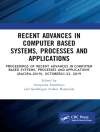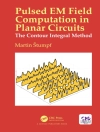Signal Processing for Joint Radar Communications
A one-stop, comprehensive source for the latest research in joint radar communications
In Signal Processing for Joint Radar Communications, four eminent electrical engineers deliver a practical and informative contribution to the diffusion of newly developed joint radar communications (JRC) tools into the sensing and communications communities. This book illustrates recent successes in applying modern signal processing theories to core problems in JRC. The book offers new results on algorithms and applications of JRC from diverse perspectives, including waveform design, physical layer processing, privacy, security, hardware prototyping, resource allocation, and sampling theory.
The distinguished editors bring together contributions from more than 40 leading JRC researchers working on remote sensing, electromagnetics, optimization, signal processing, and beyond 5G wireless networks. The included resources provide an in-depth mathematical treatment of relevant signal processing tools and computational methods allowing readers to take full advantage of JRC systems.
Readers will also find:
* Thorough introductions to fundamental limits and background on JRC theory and applications, including dual-function radar communications, cooperative JRC, distributed JRC, and passive JRC
* Comprehensive explorations of JRC processing via waveform analyses, interference mitigation, and modeling with jamming and clutter
* Practical discussions of information-theoretic, optimization, and networking aspects of JRC
* In-depth examinations of JRC applications in cutting-edge scenarios including automotive systems, intelligent reflecting surfaces, and secure parameter estimation
Perfect for researchers and professionals in the fields of radar, signal processing, communications, information theory, networking, and electronic warfare, Signal Processing for Joint Radar Communications will also earn a place in the libraries of engineers working in the defense, aerospace, wireless communications, and automotive industries.
Inhoudsopgave
Dedication
List of Editors
List of Contributors
Preface
Acknowledgements
1. A Signal Processing Outlook Toward Joint Radar-Communications
Kumar Vijay Mishra, M. R. Bhavani Shankar, Björn Ottersten, and A. Lee Swindlehurst
2. Principles of Dual-Function Radar-Communication Systems
Aboulnasr Hassanien and Moeness G. Amin
3. Interference, Clutter, and Jamming Suppression in Joint Radar-Communications Systems: Coordinated and Uncoordinated Designs
Jeremy Johnston, Junhui Qian, and Xiaodong Wang
4. Beamforming and Interference Management in Joint Radar-Communication Systems
Tuomas Aittomäki, Yuanhao Cui, and Visa Koivunen
5. Information Theoretic Aspects of Joint Sensing and Communications
Mari Kobayashi and Giuseppe Caire
6. Radar-aided Communication
Nuria González-Prelcic, Anum Ali, and Yun Chen
7. Design of Constant Envelope Radar Signals Under Multiple Spectral Constraints
Augusto Aubry, Jing Yang, Antonio De Maio, Guolong Cui, and Xianxiang Yu
8. Spectrum Sharing Between MIMO Radar and MIMO Communication
Bo Li and Athina P. Petropulu
9. Performance and Design for Cooperative MIMO Radar and MIMO Communications
Qian He, Zhen Wang, Junze Zhu, and Rick S. Blum
10. Frequency-Hopping MIMO Radar-based Data Communications
Kai Wu, J. Andrew Zhang, Xiaojing Huang, and Y. Jay Guo
11. Optimized Resource Allocation for Joint Radar-Communications
Ammar Ahmed and Yimin D. Zhang
12. Emerging Prototyping Activities in Joint Radar-Communications
M. R. Bhavani Shankar, Kumar Vijay Mishra, and Mohammad Alaee-Kerahroodi
13. Secrecy Rate Maximization for Intelligent Reflective Surface Assisted MIMO Communication
Sisai Fang, Gaojie Chen, Sangarapillai Lambotharan, Cunhua Pan, and Jonathon A. Chambers
14. Privacy in Spectrum Sharing Systems with Applications to Communications
Konstantinos Psounis and Matthew A Clark
Over de auteur
Kumar Vijay Mishra, Ph D, is a Senior Fellow at the United States CCDC Army Research Laboratory, Adelphi, USA. He received his Ph D from The University of Iowa, Iowa City, USA in 2015 and is the co-editor of four upcoming books on radar.
M. R. Bhavani Shankar, Ph D, is an Assistant Professor at the University of Luxembourg where he will be heading the SPARC research group. He received his Ph D from Indian Institute of Science and has over 200 publications in wireless and satellite communications as well as radar.
Björn Ottersten, Ph D, is Professor of Electrical Engineering at KTH, Royal Institute of Technology, Stockholm, Sweden. He received the Ph D from Stanford University in 1990 and has over 900 publications on topics in signal processing, wireless communications, and radar.
A. Lee Swindlehurst, Ph D, is Professor of Electrical Engineering and Computer Science at the University of California Irvine. He received the Ph D from Stanford University in 1991, and has over 350 publications on topics in signal processing, wireless communications and radar.












